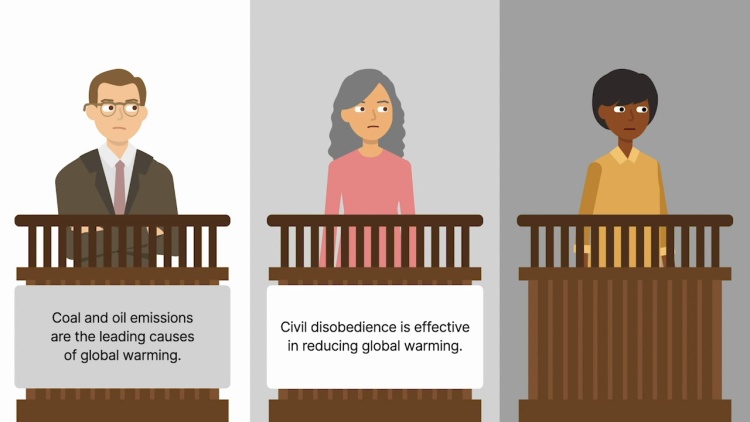State ex rel. Haskell v. Spokane County District Court
Washington Court of Appeals
465 P.3d 343, 13 Wash. App. 2d 573 (2020)
- Written by Heather Whittemore, JD
Facts
Reverend George Taylor (defendant) was an environmental activist in Spokane, Washington, involved in a campaign to stop the railroad transportation of coal and oil. Taylor believed that the railroad transportation of coal and oil created risks of dangerous derailments, spills, and explosions. After Taylor failed in his attempts to convince local legislators to act in regard to the railroad transportation of coal and oil, Taylor joined a group of protestors who stood on a train track owned by BNSF Railway Company (BNSF) to block an incoming train delivering coal and oil. BNSF had posted a sign warning trespassers that their actions were illegal, and Taylor knew that he was trespassing. Taylor was arrested and charged with criminal trespass and obstruction of a train. Taylor filed a motion with the state district court, asking the court to allow him to present a necessity defense at trial. Taylor argued that his actions were necessary to prevent harm caused by the railroad transportation of coal and oil, that the harm caused by his actions was less than the potential harm presented by the transportation, and that he had no reasonable legal alternatives to stop the transportation given that his attempts at legislative reform had failed. To support his motion, Taylor called three expert witnesses. The expert witnesses testified about the risks associated with climate change, the effectiveness of nonviolent civil disobedience to fight against climate change, and the environmental risks associated with the railroad transportation of coal and oil, respectively. The district court granted Taylor’s motion. The state (plaintiff) filed a petition with a county superior court, arguing that Taylor was not entitled to present a necessity defense. The superior court reversed the district court. Taylor appealed.
Rule of Law
Issue
Holding and Reasoning (Lawrence-Berrey, J.)
Dissent (Fearing, J.)
What to do next…
Here's why 909,000 law students have relied on our case briefs:
- Written by law professors and practitioners, not other law students. 47,100 briefs, keyed to 997 casebooks. Top-notch customer support.
- The right amount of information, includes the facts, issues, rule of law, holding and reasoning, and any concurrences and dissents.
- Access in your classes, works on your mobile and tablet. Massive library of related video lessons and high quality multiple-choice questions.
- Easy to use, uniform format for every case brief. Written in plain English, not in legalese. Our briefs summarize and simplify; they don’t just repeat the court’s language.






